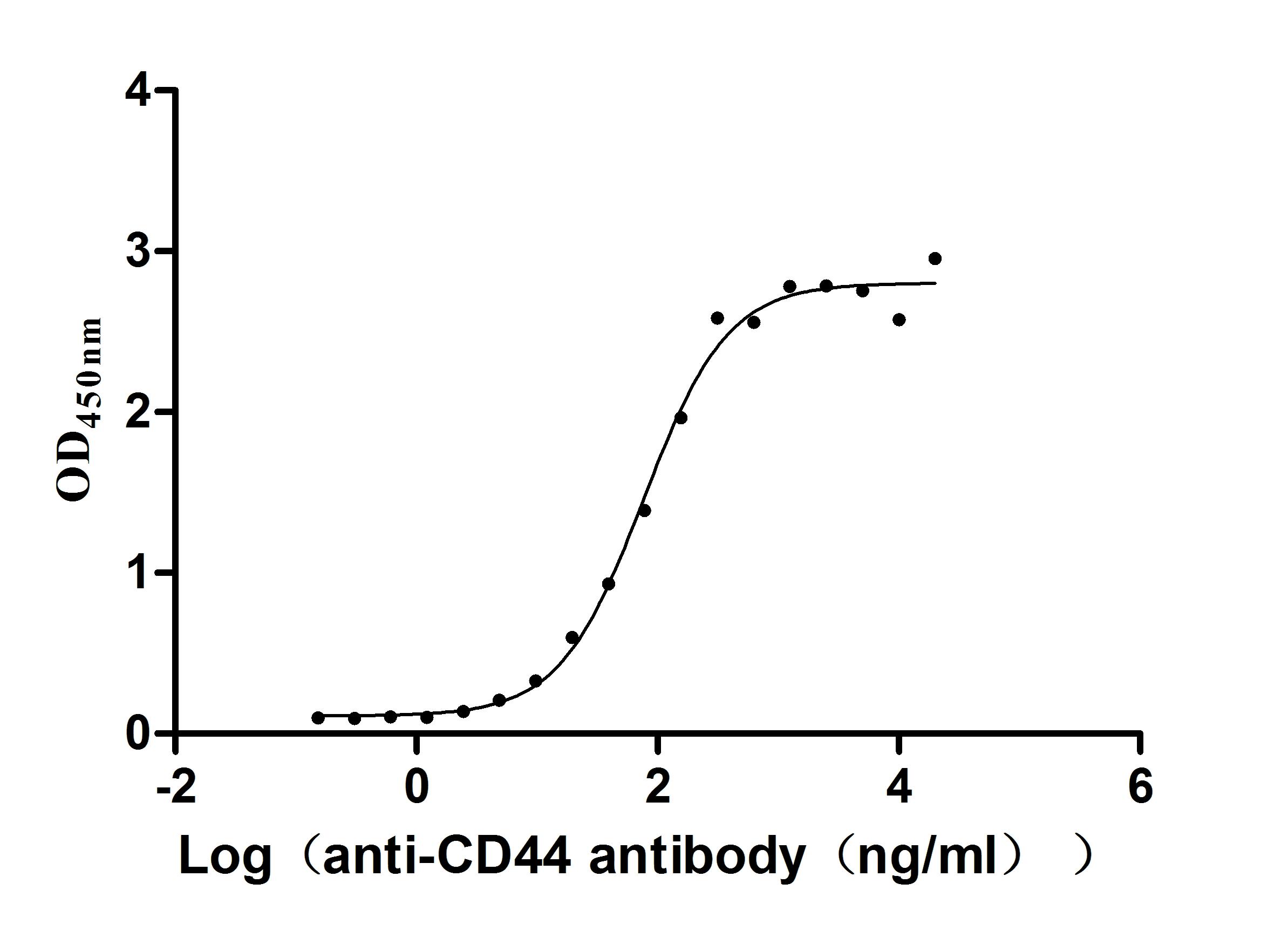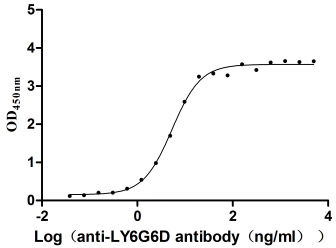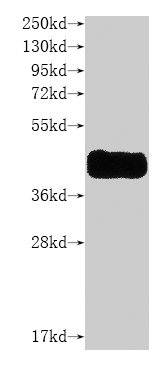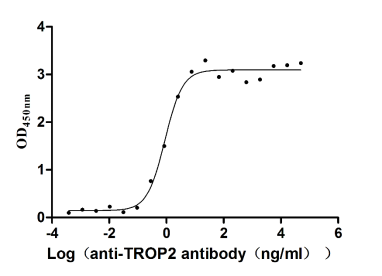Recombinant Human N-myc-interactor (NMI)
-
货号:CSB-YP618768HU
-
规格:
-
来源:Yeast
-
其他:
-
货号:CSB-EP618768HU
-
规格:
-
来源:E.coli
-
其他:
-
货号:CSB-EP618768HU-B
-
规格:
-
来源:E.coli
-
共轭:Avi-tag Biotinylated
E. coli biotin ligase (BirA) is highly specific in covalently attaching biotin to the 15 amino acid AviTag peptide. This recombinant protein was biotinylated in vivo by AviTag-BirA technology, which method is BriA catalyzes amide linkage between the biotin and the specific lysine of the AviTag.
-
其他:
-
货号:CSB-BP618768HU
-
规格:
-
来源:Baculovirus
-
其他:
-
货号:CSB-MP618768HU
-
规格:
-
来源:Mammalian cell
-
其他:
产品详情
-
纯度:>85% (SDS-PAGE)
-
基因名:NMI
-
Uniprot No.:
-
别名:NMI; N-myc-interactor; Nmi; N-myc and STAT interactor
-
种属:Homo sapiens (Human)
-
蛋白长度:full length protein
-
表达区域:1-307
-
氨基酸序列MEADKDDTQQ ILKEHSPDEF IKDEQNKGLI DEITKKNIQL KKEIQKLETE LQEATKEFQI KEDIPETKMK FLSVETPEND SQLSNISCSF QVSSKVPYEI QKGQALITFE KEEVAQNVVS MSKHHVQIKD VNLEVTAKPV PLNSGVRFQV YVEVSKMKIN VTEIPDTLRE DQMRDKLELS FSKSRNGGGE VDRVDYDRQS GSAVITFVEI GVADKILKKK EYPLYINQTC HRVTVSPYTE IHLKKYQIFS GTSKRTVLLT GMEGIQMDEE IVEDLINIHF QRAKNGGGEV DVVKCSLGQP HIAYFEE
-
蛋白标签:Tag type will be determined during the manufacturing process.
The tag type will be determined during production process. If you have specified tag type, please tell us and we will develop the specified tag preferentially. -
产品提供形式:Lyophilized powder
Note: We will preferentially ship the format that we have in stock, however, if you have any special requirement for the format, please remark your requirement when placing the order, we will prepare according to your demand. -
复溶:We recommend that this vial be briefly centrifuged prior to opening to bring the contents to the bottom. Please reconstitute protein in deionized sterile water to a concentration of 0.1-1.0 mg/mL.We recommend to add 5-50% of glycerol (final concentration) and aliquot for long-term storage at -20℃/-80℃. Our default final concentration of glycerol is 50%. Customers could use it as reference.
-
储存条件:Store at -20°C/-80°C upon receipt, aliquoting is necessary for mutiple use. Avoid repeated freeze-thaw cycles.
-
保质期:The shelf life is related to many factors, storage state, buffer ingredients, storage temperature and the stability of the protein itself.
Generally, the shelf life of liquid form is 6 months at -20°C/-80°C. The shelf life of lyophilized form is 12 months at -20°C/-80°C. -
货期:Delivery time may differ from different purchasing way or location, please kindly consult your local distributors for specific delivery time.Note: All of our proteins are default shipped with normal blue ice packs, if you request to ship with dry ice, please communicate with us in advance and extra fees will be charged.
-
注意事项:Repeated freezing and thawing is not recommended. Store working aliquots at 4°C for up to one week.
-
Datasheet :Please contact us to get it.
相关产品
靶点详情
-
功能:Acts as a signaling pathway regulator involved in innate immune system response. In response to interleukin 2/IL2 and interferon IFN-gamma/IFNG, interacts with signal transducer and activator of transcription/STAT which activate the transcription of downstream genes involved in a multitude of signals for development and homeostasis. Enhances the recruitment of CBP/p300 coactivators to STAT1 and STAT5, resulting in increased STAT1- and STAT5-dependent transcription. In response to interferon IFN-alpha, associates in a complex with signaling pathway regulator IFI35 to regulate immune response; the complex formation prevents proteasome-mediated degradation of IFI35. In complex with IFI35, inhibits virus-triggered type I IFN-beta production when ubiquitinated by ubiquitin-protein ligase TRIM21. In complex with IFI35, negatively regulates nuclear factor NF-kappa-B signaling by inhibiting the nuclear translocation, activation and transcription of NF-kappa-B subunit p65/RELA, resulting in the inhibition of endothelial cell proliferation, migration and re-endothelialization of injured arteries. Negatively regulates virus-triggered type I interferon/IFN production by inducing proteosome-dependent degradation of IRF7, a transcriptional regulator of type I IFN, thereby interfering with cellular antiviral responses. Beside its role as an intracellular signaling pathway regulator, also functions extracellularly as damage-associated molecular patterns (DAMPs) to promote inflammation, when actively released by macrophage to the extracellular space during cell injury or pathogen invasion. Macrophage-secreted NMI activates NF-kappa-B signaling in adjacent macrophages through Toll-like receptor 4/TLR4 binding and activation, thereby inducing NF-kappa-B translocation from the cytoplasm into the nucleus which promotes the release of proinflammatory cytokines.
-
基因功能参考文献:
- These results revealed that IRF-1 is involved in the IFN-inducible expression of Nmi. PMID: 28913576
- Our study showed that NMI suppressed tumor growth by inhibiting PI3K/AKT, MMP2/MMP9, COX-2/PGE2 signaling pathways and p300-mediated NF-kappaB acetylation, and predicted a favorable prognosis in human lung adenocarcinomas, suggesting that NMI was a potential tumor suppressor in lung cancer. PMID: 29025423
- results provide new insights into understanding the regulatory mechanism of cancer stem cells and suggest that the NMI-YY1-hTERT signaling axis may be a potential therapeutic target for breast cancers. PMID: 28492540
- Damage-associated molecular patterns (DAMP) are important mediators of innate immunity. Here the s show that N-myc and STAT interactor (NMI) and interferon-induced protein 35 (IFP35) act as DAMPs to promote inflammation by activating macrophages via the Toll-like receptor 4 and NF-kappaB pathways. PMID: 29038465
- These investigations demonstrated etoposide-induced NMI can suppress tumor proliferation and promote cell apoptosis by activating the ARF-p53 signaling pathway in lung carcinoma. Our results provide an alternative mechanism for etoposide in lung carcinoma and suggest NMI has a critical role in suppressing lung carcinoma progression. PMID: 29030066
- Data suggest that N-myc (and STAT) interactor (NMI) could improve its downstream target bradykinin B2 receptor (BDKRB2) expression to induce extracellular signal-regulated kinases (ERK) 1/2 activation, and thereby further evoke malignant progression of hepatocellular carcinoma (HCC). PMID: 28077802
- N-Myc-interacting protein (NMI) negatively regulates epithelial-mesenchymal transition by inhibiting the acetylation of NF-kappaB/p65 in histone deacetylase-dependent manner. PMID: 27012186
- N-myc and STAT interactor sensitizes breast cancer cells to cisplatin treatment through DRAM1 dependent autophagy. PMID: 26146406
- Results show that aberrant miR-29 expression may account for reduced NMI expression in breast tumors and mesenchymal phenotype of cancer cells that promotes invasive growth. PMID: 25174825
- The results showed that SARS coronavirus protein 6 can promote the ubiquitin-dependent proteosomal degradation of Nmi. PMID: 25907116
- overexpression or depletion of NMI revealed its regulation on G1/S progression and cell proliferation (both in vitro and in vivo), and this effect was partially dependent on STAT1, which interacted with and was regulated by NMI. PMID: 25669971
- Trim21 regulates Nmi-IFI35 complex-mediated inhibition of innate antiviral response PMID: 26342464
- Its potential function in transcriptional activation of NMI. PMID: 25387807
- identified NMI induction as a novel negative feedback mechanism that decreases IRE1alpha-dependent activation of JNK and apoptosis in cytokine-exposed beta cells PMID: 24936061
- Thus our work reveals a novel NMI-mediated, transcription-independent ARF induction pathway in response to cellular stresses. PMID: 23034180
- Dissociation of the IFN-induced protein NMI from IFP35 is a newly defined specific cytoplasmic event occurring during apoptosis. PMID: 11911807
- complex with BRCA1 and c-Myc inhibits c-Myc-induced human telomerase reverse transcriptase gene promoter activity in breast cancer PMID: 11916966
- Apoptin mutant T1 still interacted with Nmi, suggesting that its C-terminal 11 AA was not essential for the interaction. PMID: 12019454
- STAT1 and Nmi are downstream targets of Ets-1 in MCF-7 human breast cancer cells PMID: 15996661
- identified an association of Sox10 with the N-myc interactor Nmi, which was mediated by the high-mobility group of Sox10 and the central region of Nmi; Nmi modulated the transcriptional activity of Sox10 PMID: 16214168
- The results provide a novel role of CKIP-1 in cytokine signaling response and the biochemical mechanism, by which two previously identified modulators IFP35 and Nmi are involved via interactions. PMID: 17197158
- Activation of PKCdelta in response to Camptothecin treatment requires Myc and is important in CPT-mediated apoptosis signaling. PMID: 17565738
- Data suggest that overexpression of Nmi inhibits the Wnt/beta-catenin signaling via up-regulation of Dkk1 and retards tumor growth. PMID: 19358268
显示更多
收起更多
-
亚细胞定位:Cytoplasm. Nucleus. Secreted.
-
蛋白家族:NMI family
-
组织特异性:Expressed in adult spleen, liver, and kidney. Expressed in fetal thymus, liver, placenta, spleen, lung, and kidney but not brain. Expressed in macrophages.
-
数据库链接:
HGNC: 7854
OMIM: 603525
KEGG: hsa:9111
STRING: 9606.ENSP00000243346
UniGene: Hs.54483
Most popular with customers
-
Recombinant Human Claudin-18.2 (CLDN18.2)-VLPs (Active)
Express system: Mammalian cell
Species: Homo sapiens (Human)
-
Recombinant Human C-X-C chemokine receptor type 4 (CXCR4)-VLPs (Active)
Express system: Mammalian cell
Species: Homo sapiens (Human)
-
Recombinant Mouse Retinol-binding protein 4 (Rbp4) (Active)
Express system: Mammalian cell
Species: Mus musculus (Mouse)
-
Recombinant Human Claudin-6 (CLDN6)-VLPs (Active)
Express system: Mammalian cell
Species: Homo sapiens (Human)
-
Recombinant Macaca fascicularis CD44 antigen (CD44), partial (Active)
Express system: Mammalian cell
Species: Macaca fascicularis (Crab-eating macaque) (Cynomolgus monkey)
-
Recombinant Macaca fascicularis lymphocyte antigen 6 family member G6D (LY6G6D) (Active)
Express system: Yeast
Species: Macaca fascicularis (Crab-eating macaque) (Cynomolgus monkey)
-
Recombinant Human C-C chemokine receptor type 8 (CCR8)-VLPs (Active)
Express system: Mammalian cell
Species: Homo sapiens (Human)
-
Recombinant Human Tumor-associated calcium signal transducer 2 (TACSTD2), partial (Active)
Express system: Mammalian cell
Species: Homo sapiens (Human)


-AC1.jpg)
-AC1.jpg)
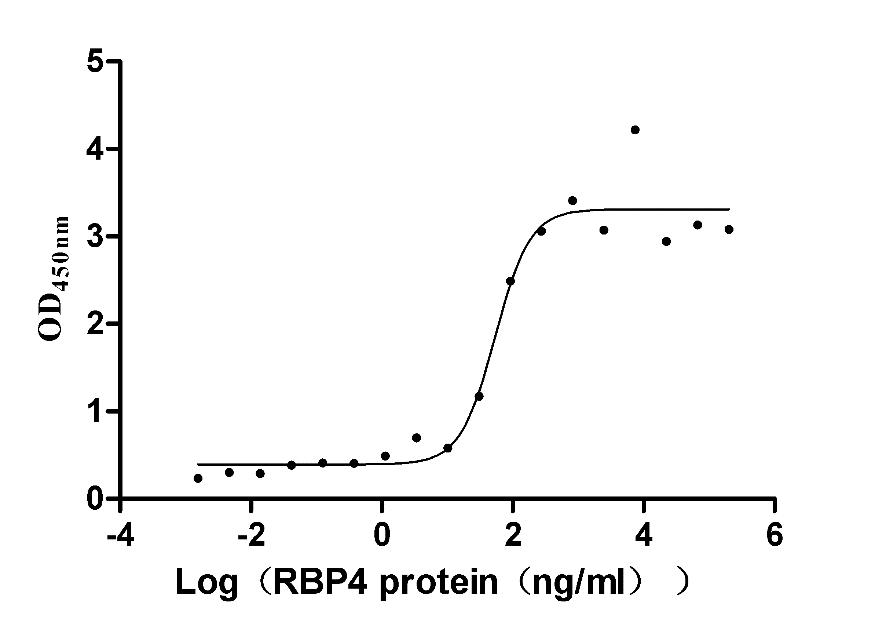
-AC1.jpg)
